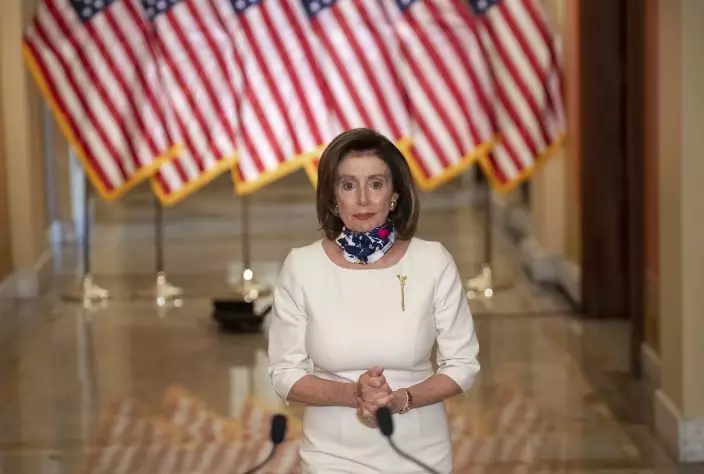Senate Majority Leader Mitch McConnell on Thursday branded House Democrats' $3 trillion economic relief bill a “totally unserious effort” to address the coronavirus pandemic, underscoring the deep election-year gulch over what Congress' next response to the crisis should be.
Two days after House Speaker Nancy Pelosi unveiled what would be Congress' fifth and largest package for nursing the dormant economy through the emergency, McConnell, R-Ky., said Democrats had produced a “seasonal catalog of left-wing oddities and called it a coronavirus relief bill."
Provisions he singled out for criticism included a rollback of GOP-passed tax increases on residents of states with high taxes, language making it easier for people to vote by mail and what he called “the cherry on top” — provisions helping legal marijuana businesses.

House Speaker Nancy Pelosi of Calif., walks to speak about the so-called Heroes Act, Tuesday, May 12, 2020 on Capitol Hill in Washington. Pelosi unveiled a more than $3 trillion coronavirus aid package Tuesday, providing nearly $1 trillion for states and cities, “hazard pay” for essential workers and a new round of cash payments to individuals. (Saul LoebPool via AP)
“This is a totally unserious effort,” he said.
The House Democratic bill would provide nearly $1 trillion to help financially struggling state and local governments, extend special unemployment benefits and direct payments to individuals, and bolster spending for health care programs and essential workers.
Senate Minority Leader Chuck Schumer, D-N.Y., criticized McConnell on Thursday for saying last week that Congress should “pause” before spending more money on the effort.
“Time to press the pause button? When we have faced the greatest health and economic crisis since the Depression?” Schumer said.
House members scattered around the country because of the dangers of traveling and congregating in groups are returning to Washington. The chamber is expected to approve Pelosi’s package Friday in a largely party-line vote. The smaller Senate has been in session since last week.
The House vote will come as 36 million Americans have applied for unemployment benefits since the virus hit the U.S.. In addition, 1.4 million people in the U.S. have confirmed cases of the virus and more than 84,000 have died.
Federal Reserve Chair Jerome Powell has said a painful, prolonged recession could take hold unless Congress provides fresh aid to bolster the all-but-dormant economy.
The bill unveiled by Pelosi, D-Calif., has been seen as Democrats' opening bid in what seems likely to be negotiations with the GOP-led Senate and the Trump administration.
President Donald Trump's views on what to do next have been unclear. He's pushed for a reduction of payroll taxes that's gained little support in Congress.
Trump has also cautioned GOP lawmakers not to box themselves in by opposing aid for state and local governments, according to a top GOP congressional aide who described Trump's view on condition of anonymity. Many state and local officials of both parties have sought more federal aid as they face eroding revenue and growing costs for unemployment and health programs.
McConnell has already said he doesn't expect the Senate to begin considering additional legislation until after Memorial Day. He's left the door open to a “narrowly targeted” bill and reiterated Thursday a chief GOP demand — provisions that would protect reopening businesses from liability claims.
Congress has already approved nearly $3 trillion this year to address the twin health and economic crises.
Along with top Trump administration officials, McConnell and other congressional leaders have expressed worries about burgeoning budget deficits and said lawmakers should evaluate how the initial dollars are being spent before moving fresh legislation. They also want to see whether the economy begins to recover as some states begin easing restrictions that have kept many businesses shuttered.


